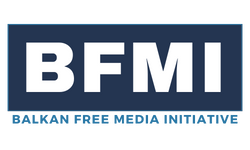Anti-SLAPP Directive is coming. Will it really protect journalists in the Balkans?
The Anti-SLAPP Directive is set to become a reality in the EU, offering substantial protection to victims of Strategic Lawsuits Against Public Participation (SLAPPs). BFMI Director Antoinette Nikolova writes that this much-needed protection will have significant implications for journalists in the Balkans.
The European Union is on the cusp of a legislative breakthrough that promises to bolster the defences of journalists and human rights defenders against Strategic Lawsuits Against Public Participation (SLAPPs)—a weapon increasingly used by powerful entities to stifle critical voices through legal intimidation. This agreement, achieved during Spain's presidency of the Council, signifies a crucial step in addressing the growing trend of influential and wealthy entities using such lawsuits to suppress individuals voicing important public concerns. SLAPPs primarily aim to censor, intimidate, and silence critics by imposing overwhelming legal costs, thereby coercing them into abandoning their critique or opposition.
Addressing SLAPPs through regulation could be the most effective way to counteract plaintiffs and better protect journalists and activists. A recent study, conducted by Francesca Farrington and Justin Borg-Barthet of Aberdeen University and presented to Members of the European Parliament (MEPs), suggests shifting the focus from the claimant’s motivation to the act of public participation and the plaintiff's litigation tactics, allowing for more protections on the victims of SLAPPS.
While the agreement has watered-down some of the proposals presented by the European Parliament (EP) in July, it includes important provisions to protect journalists from these censorship weapons:
Individuals targeted by SLAPPs can request the court to impose a financial security on the claimant. Courts may also require claimants to provide security for legal expenses and potentially bear all proceeding costs, including legal representation fees of the SLAPP victim.
Defendants will be able to take action to protect themselves from judgements in SLAPP cases originating from third countries, including the option to seek compensation for damages and costs in court related to proceedings in a third country.
The EP definition of ‘cross-border cases’, which the Council initially proposed removing, has been reinstated. Therefore, all cases will be considered cross-border unless both parties are domiciled in the same member state as the court and all relevant elements are located within that state.
The Balkans: A Hotspot for SLAPPs
Greece and Bulgaria are among the EU countries with most SLAPP cases in 2022 and 2023, according to the Aberdeen University study. Over 47 cases were identified involving a total of 102 defendants. The highest number was recorded in Italy (25.5%). Greece is third (12.8%), followed by Bulgaria and (10.6%). Croatia ranks seventh with 4.3%.
Bulgaria showcases the urgent need for anti-SLAPPs legislation. Case in point, Bivol, an investigative website, faced a staggering civil defamation claim of €500,000, a figure that threatened its very existence.
Mediapool, another Bulgarian media outlet, is embroiled in a civil defamation lawsuit initiated by an insurance company, demanding damages amounting to 500,000 EUR—a sum that could potentially bankrupt the outlet. The media freedom watchdog, Mapping Media Freedom, has highlighted the severity of the claim, which they believe could extinguish the outlet financially. The lawsuit is perceived by Mediapool's owner and Editor-in-Chief as an attempt to quash legitimate journalistic work. The insurance company filed the suit following an article Mideapool published, which reported on statements from the then acting Minister of Finance, which were part of an official transcript from the Council of Ministers.
Three Bulgarian journalists have also been the subject of multiple lawsuits initiated just one individual.
Greece has also seen the rise of SLAPPs coming from individuals in the private sectors as well as prominent politicians. Since 2020, Ioannis Zaboukis, the mayor of Alexandroupolis, has regularly been filing lawsuits against journalists critical of his administration. Altherthess, along with journalist Stavroula Poulimeni, are grappling with a €100,000 claim from Hellas Gold executive Efstathios Lialios over a report on his criminal conviction. Investigative reporter Thodoris Chondrogiannos and his former employer, insidestory.gr, are being sued by Rewarding Packaging Recycling for €80,000. Additionally, journalist Tasos Sarantis of Efimerida ton Syntakton is embroiled in a €225,000 defamation suit filed by WRE Hellas, a renewable energy firm, over his reporting on a wind farm project.
These cases, many of which are pending judicial verdicts, exemplify the precarious position of journalists in Greece who are facing aggressive legal intimidation tactics for their investigative reporting.
The Anticipated Impact of the Anti-SLAPP Directive
The proposed directive is a significant stride towards rectifying the imbalance and providing a fairer playing field for defendants. If endorsed by the member states' representatives within the Council and formally adopted by the Council and the European Parliament, it could set a precedent for legal protections against SLAPPs, not just within the EU but as a standard for others to follow. It is crucial that anti-SLAPPs legislation is also included to accession country negotiations, such as Serbia.
More will need to be done to protect journalists and media outlets in the EU and future EU-members. This initiative, which have been long advocated for by media freedom organisations, is a right step towards the protection of those who dare to speak truth to power.

